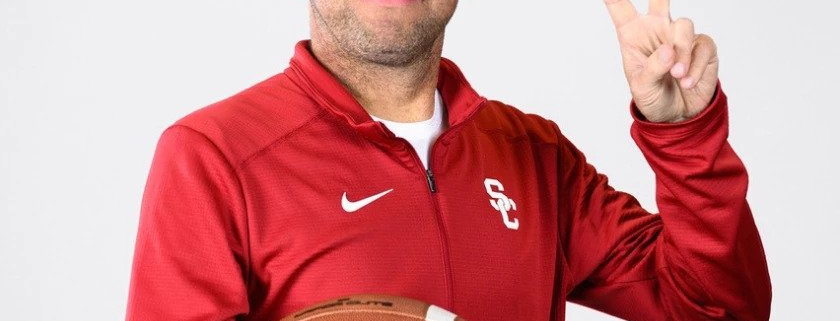Lincoln Riley reflects on Dave Nichol’s passing

It was a somber Saturday Zoom press conference for Head Coach Lincoln Riley who remembered Dave Nichol, USC’s Assistant Coach who passed away Friday. He was 45.
Riley said everyone on staff was “in a little bit of a fog, like a haze,” Friday, but that playing back on the field Saturday was a form of everyone getting away.
Nichol’s health deteriorated in the last couple of weeks. Riley announced last Monday that Nichol would take time away from the team to attend to a private health manner.
Nichol joined USC this season, after spending the previous two seasons at Mississippi State as an inside receivers coach. Prior to that, he worked as inside receivers coach in the Pac-12 at Washington State for three seasons. Nichol also spent some time at Eastern Carolina and Arizona after starting at Texas Tech in 2000.
It was reported that Nichol was battling cancer.
Riley credited Nichol with opening the door for him to become a coach, especially since Riley said he had no other connections into the business. Riley described Nichol as someone who just “really loves ball.”
He first met Nichol as a walk-on at Texas Tech in 2002 where Nichol served as a graduate assistant. It was that moment that changed the tide for Riley’s future career.
“There’s a strong possibility I wouldn’t be in college coaching without him … he was really the one who kind of gave me my first shot to walk on at Texas Tech,” Riley said. “He was kind of the guy that guided me, led me, taught me how to become a coach.”
Riley said he “bugged” Nichol in those early years to learn as much as possible about the offense, and Nichol gave him all he wanted.
When Riley would call, instead of talking about Nichol’s health, the associate head coach insisted that Riley tell him about the team’s workouts and how the transition was going.
“I’d go home at night [during the] last couple of weeks when he wasn’t feeling too good and he didn’t want to talk about none of that,” Riley said. “All he wanted to talk about was how the guys are doing, how’s install going … That just kind of shows you who he was.”
When Riley made the move to USC, he said it was an immediate decision to bring Nichol on staff. The two had complemented each other, Riley said.
“He’s just one of those guys in the business that knew our stuff inside and out,” Riley said. “You could trust him so much as a coach. He was always going to get his job done. He was always going to put the team first … he was just the epitome of a great coach and a great person.”

